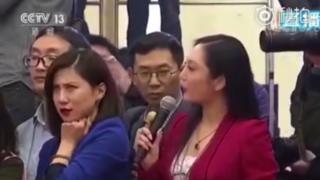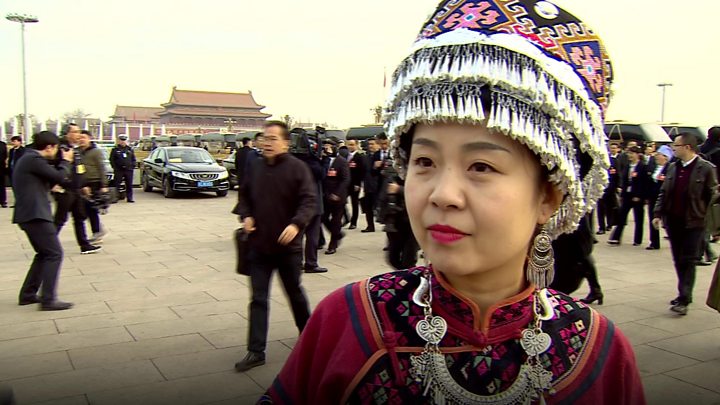 Image copyright
Image copyright
Weibo
This female journalist appeared to be rolling her eyes at a fellow reporter’s question
China’s National People’s Congress is in full swing with dozens of choreographed press conferences on the sidelines. From screening questions to blocking posts, Communist Party officials use these events to manage the message but even in this highly-controlled environment things can spin out of control.
If you get to see a press conference at this Congress, it’s likely that reporters selected to ask a question have had it vetted by a government official who will coyly then say something like, “Oh, let’s hope you get to ask that”.
However, it doesn’t seem hard to find a Chinese journalist who, for example, on the one opportunity each year to face Foreign Minister Wang Yi doesn’t want to know about Syria, North Korea, a potential trade war, the South China Sea and the like.
What they do want to know is…
People’s Daily: “Thank you moderator, Foreign Minister, hello. Since the 18th Party Congress, China’s diplomatic work has made unprecedented important achievements and has won unanimous praise from Chinese people. We know that 2018 was the first year after the 19th Party Congress. What have been the highlights of China’s diplomacy this year? Can you tell us about it? Thank you.”
Foreign Minister Wang Yi: “Since the 18th Party Congress, under the correct leadership of the Party Central Committee with Comrade Xi Jinping as the core, we have indeed emerged on a road to great power diplomacy with Chinese characteristics, Chinese style… “
Image copyright
Getty Images
Most journalists selected to ask questions at NPC press conferences have had their question vetted
Here’s another punchy offering from Beijing TV to the foreign minister:
Beijing TV: “Hello, Foreign Minister. A few days ago, Premier Li Keqiang pointed out in his government work report that this year marks the beginning of the full implementation of the spirit of the 19th Party Congress.
This is the 40th anniversary of reform and opening up. It is a crucial year to realize a moderately prosperous society and the implementation of the 13th Five-Year Plan. You have repeatedly emphasized that serving the development of the country has always been the central task of China’s diplomacy. I would like to know more about what measures the Ministry of Foreign Affairs will take this year. Thank you.”
Foreign Minister Wang Yi: “China is still a developing country and promoting domestic development is part great power diplomacy with Chinese characteristics. In the face of a new historical mission… etc”
In another press conference on the sidelines of the Congress, Zhang Huijun – a journalist from American Multimedia TV – asked the chairman of the state-owned Assets Supervision and Administration Commission in her most perky and enthusiastic voice, “China has more and more state own assets abroad following the Belt and Road initiative. How can we protect them?”
It was too much for a reporter from Shanghai-based business TV channel Yicai who, standing next to her, could be seen rolling her eyes at what a, well, sycophantic offering this was.
The eye-rolling journalist, Liang Xiangyi, was seen on television and filmed on various people’s phones.
Her facial expressions are now going viral.
Within hours people were dressing in red and blue, filming themselves imitating the two women.
Liang Xiangyi’s expressions have even been turned into a series of gifs, but posts on social media platforms using her name in Chinese are already being censored.
You also have to wonder whether this reporter, who couldn’t control her natural reaction, might now be punished. In other countries this might be just funny. Not here.
Image copyright
Getty Images
The National People’s Congress meets every year in March
This is exactly the type of meltdown the Communist Party doesn’t want to have because it shows what a farce the Congress press conferences can be.
- In depth: Xi, the president who lived in a cave
- How China’s ‘two sessions’ meetings work
- Why China is censoring Winnie the Pooh again
Many will say it’s the Party’s own fault for stacking these events with ever more gushing questioners who even sound hilarious to Chinese ears which have taken in this stuff for decades.
And, if things can spin out of control with the local media, imagine the concern when foreign correspondents are getting involved.
Sometimes a government official, perhaps from the Foreign Ministry, will contact major international news organisations and ask them if they would like to “have a question” at a news conference.
Readers might wonder why Communist Party officials bother with all the hassle of tying to manage an unpredictable foreign press corps.
Why not just stop us all going in and let the local press – under Party control – ask the desired questions?
The answer: because they want us there.
They want the foreign media in the room to show a domestic audience how internationally significant the National People’s Congress is.
Image copyright
Getty Images
Foreign correspondents are divided on whether to submit questions to the NPC
All the Congress media events are controlled to some extent but none more so than the premier’s which takes place on the last day.
As foreign correspondents arrive some are urged to sit down the front, although they have no hope whatsoever of being called on. This is so that Chinese television can show their faces, show their hands up, show them taking down on their notepads the profound offerings of China’s leadership.
At the beginning of this Congress, Chris Buckley from the New York Times took to Twitter to urge his fellow correspondents not allow themselves to be used as tools of propaganda.
He posted on Twitter: “My prayer for this NPC: Please reporters stop the game of negotiating to ask tame questions… a charade of accountability will do nobody any good and does us discredit.”
To participate or not?
The extent to which we should participate is the subject of considerable debate amongst foreign correspondents based here.
Some argue we should not attend at all and just report events from afar. Others say it’s worth submitting questions and asking them in order to try and make the best out of a deeply flawed situation.
The BBC, for example, has decided not submit questions for screening. This means we don’t get called on. In other countries reporters would just shout out the questions anyway and perhaps that is what we should all consider doing.
On the other hand, if you would like to know how Chinese officials would prefer to see the Congress covered then here is a little taste .
The article below is about the constitutional change paving the way for President Xi Jinping – and all other future presidents – to remain in power beyond a two-term limit, potentially for as long as they desire. There has been no national debate about this enormous change to the way 1.5 billion people are to be ruled. It has been barely mentioned in state media. See if you can find a meaningful reference to it in an article from the Party’s official Xinhua newswire.
The NPC finishes on 20 March, with an even more empowered President Xi Jinping “as the core”.
Keep an eye out for the final press conference with Premier Li Keqiang.
It is possible that not a single reporter will be able ask why it has been so necessary to dispense with two-term presidential limits (one of this country’s only checks on power introduced to prevent the emergence of another Chairman Mao) so as to allow Xi Jinping to rule China for the rest of his life.
One of the most significant changes to the way China is ruled in decades, at this Congress, and potentially not one decent question to the premier about it?
We’ll see. Let’s hope there is one.

Eye rolls and tame questions at China’s Congress}

